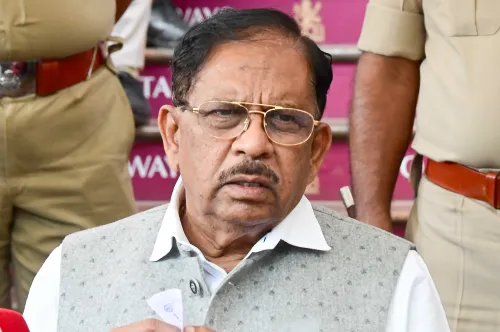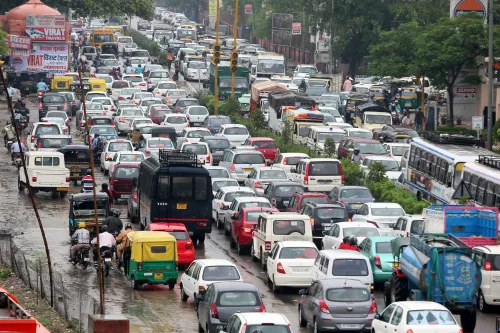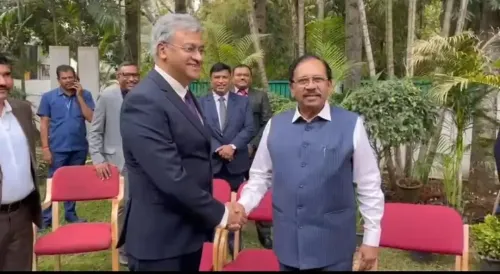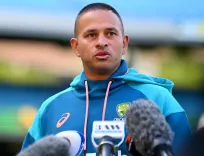How is EAM Jaishankar Showcasing PM Modi's Global Clout?

Synopsis
Key Takeaways
- Shift to Proactive Diplomacy: India's foreign policy has transitioned to a proactive and assertive stance under PM Modi.
- Operation Sindoor's Success: A significant military and diplomatic achievement showcasing India's right to self-defense.
- Strengthened Global Alliances: Enhanced ties with nations like the U.S., Japan, and Australia.
- BRICS Engagement: India’s strategic role in BRICS highlights its growing international credibility.
- Economic Growth: Initiatives like 'Make in India' have significantly boosted foreign investments.
New Delhi, July 28 (NationPress) In a recent Lok Sabha session discussing Operation Sindoor, External Affairs Minister (EAM) S. Jaishankar highlighted the transformative influence of Prime Minister Narendra Modi's foreign policy on India's global stature and national security.
Jaishankar elaborated on how the Modi administration has redefined India's diplomatic strategy, fortified strategic alliances, and enhanced India's reputation as a decisive global entity, marking a stark contrast to earlier regimes.
The minister pointed out the transition from a reactive and often cautious foreign policy under the former UPA government to a proactive, assertive, and strategic vision under PM Modi's guidance.
He noted that while past administrations emphasized maintaining diplomatic dialogue even amidst cross-border terrorism, the current government has embraced a policy grounded in diplomatic strength supported by military resolve.
According to Jaishankar, this transformation has considerably boosted India’s capacity to protect its sovereignty and advocate its interests on the global stage.
One notable achievement mentioned was the government's adept management of Operation Sindoor. This operation, a calculated response to terror threats from across the border, was not only a military achievement but also a diplomatic triumph, underscoring India's right to self-defense and gaining extensive international backing.
Over 190 nations expressed solidarity with India during this time, he claimed, which reflects the global credibility India has cultivated under PM Modi's foreign policy.
Jaishankar argued that PM Modi's vision has turned India's diplomatic interactions into a holistic strategy that merges economic diplomacy, defense collaboration, and cultural outreach. He acknowledged India’s strengthening relations with vital global players, including the U.S., Japan, Australia, and European nations, as evidence of a more sophisticated and effective foreign policy.
Under PM Modi, India has not only fortified bilateral ties but has also emerged as a crucial participant in multilateral groups such as the Quad and the G20.
Jaishankar further emphasized how India's regional and multilateral diplomacy under Prime Minister Modi has yielded strategic benefits, citing two examples: the Maldives and BRICS. He pointed out that under the UPA, relations with the Maldives had deteriorated to the extent that an Indian company was ousted from a significant infrastructure project. In contrast, PM Modi was recently honored as the Guest of Honour at the Maldives’ Independence Day celebrations, with India now engaged in constructing two new airports—a powerful indication of restored trust and influence.
On the multilateral stage, Jaishankar highlighted the importance of the BRICS coalition, which features traditionally non-aligned or even adversarial nations such as China, Russia, and Iran. Despite these complexities, BRICS clearly condemned the Pahalgam terror attack and cross-border terrorism—a diplomatic win he credited to India's credibility and assertiveness under the current administration.
Moreover, Jaishankar spotlighted the government's initiatives to reshape India's narrative on terrorism. Unlike previous tactics that often relied on rhetoric, the Modi government has adopted a hardline approach backed by tangible evidence and international advocacy, resulting in greater global acknowledgment of India’s concerns regarding cross-border terrorism. He reminded the House that India has consistently raised issues related to terror sanctuaries in Pakistan at various international venues, demanding accountability.
Economic diplomacy under PM Modi’s leadership was another critical aspect of his address. Jaishankar noted that foreign investment inflows have surged significantly due to initiatives like “Make in India” and reforms aimed at enhancing the ease of doing business.
He attributed this growth to a foreign policy that aligns closely with economic priorities, enabling India to become one of the fastest-growing major economies globally.
Furthermore, Jaishankar praised PM Modi’s vigorous outreach to the Indian diaspora worldwide. He stated that PM Modi’s personal engagement with overseas Indians has fortified India’s soft power and created an extensive network of goodwill ambassadors promoting Indian culture and interests internationally. From the Americas to Africa and the Middle East, Modi’s global visits have cultivated new partnerships and deepened existing ties.
Jaishankar also discussed the government’s robust response to emerging global challenges, including the COVID-19 pandemic and geopolitical changes. He highlighted India’s vaccine diplomacy, which involved supplying millions of doses globally. This humanitarian endeavor symbolized the compassionate and strategic aspects of PM Modi’s foreign policy, enhancing India's image as a responsible global leader and promoting peace.










